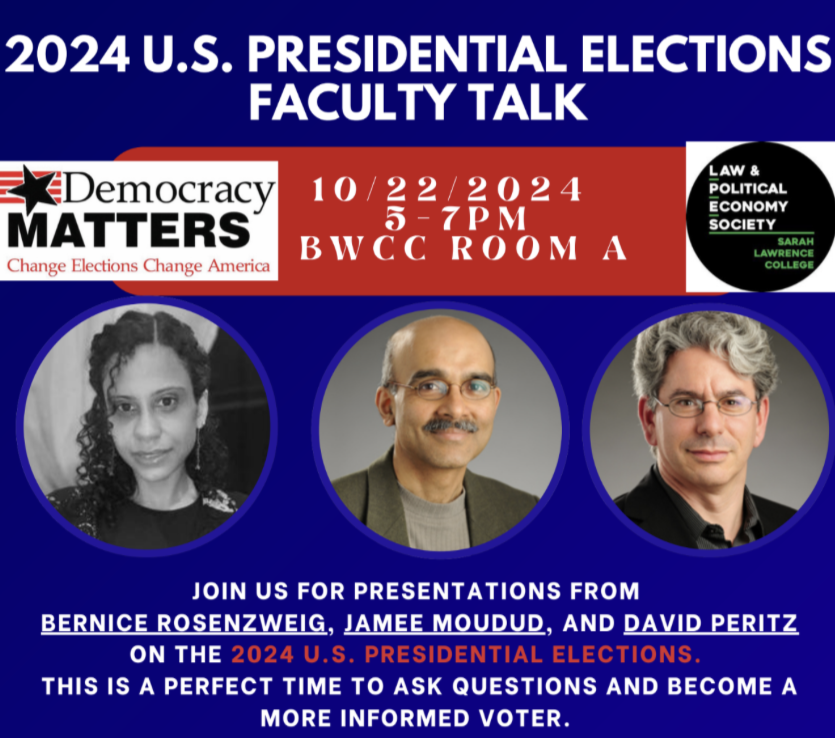Sarah Lawrence Faculty Talk: The 2024 Presidential Election
Fiona Edmonds ‘27
Graphic by Barbare Melikidze ‘27
With only two weeks left until Election Day, the Sarah Lawrence chapter of Democracy Matters has been rolling out many events and initiatives to register new voters and inform students about their civic duties. They have tabled in the Barbara Walters Campus Center twice to promote voting registration and absentee/mail-in ballot applications for students from other states. More recently, however, Democracy Matters hosted a faculty talk with the Sarah Lawrence Law and Political Economy Society.
On Oct. 22nd, students gathered to listen to three of Sarah Lawrence’s professors: Bernice Rosenzweig, Jamee Moudud and David Peritz speak about three topics concerning the 2024 election and Project 2025. Bernice Rosenzweig, professor of environmental science, spoke first and gave a moving presentation on climate change.
With a through-line of the discussion of policymaking in the realm of climate protection and science, Rosenzweig began her presentation on the recent natural disasters and how climate heating and research have impacted the reaction to such weather. Using statistical analysis, she explained that the Paris Agreement of 2015 compromised on the rise to and stabilization of 1.5ºC higher than pre-industrial levels. Pre-industrial levels are the global atmospheric conditions that existed before the Industrial Revolution. This means that the emission and concentration of greenhouse gases have increased the temperature exponentially since generally before the year 1750. Following the Paris Agreement, we have risen to about 1.3ºC higher than pre-industrial temperatures. This is close to the limit set in the Agreement, with a definite breach approaching. Essentially, this means that the average temperature is rising gradually and without an end in the near future. If this continues, the Arctic, coral reefs, along with their ecosystems, and island nations will experience irreversible damage. Rosenzweig urged that the only way to react efficiently and correctly to this devastating and irreparable change is to elect leaders who can effectively create thoughtful policies.
After Rosenzweig’s enlightening presentation, Jamee Moudud, an economics professor, took the floor. Moudud is presenting as a keynote speaker later in the week on authoritarian liberalism, which also has ties to the infamous Project 2025, and came prepared with a talk on the two matters and how they intertwine. He briefed the room on how Project 2025 plans to alter the power balance in the White House to give more power to “political appointees” that will then be able to control the different government agencies such as the EPA. This aligns with the idea of authoritarian liberalism.
Moudud defined the idea of authoritarian liberalism as “the legal construction of capitalism which makes it difficult for the demos to reverse socially regressive policies.”
This format of thinking not only follows a strictly “no alternative” form of policy-making but creates an Orwellian double-speak phrase: the use of a powerful state to free the market. Moudud concludes by saying that the markets are the problem, rather than the “interferences” of the government agencies that Project 2025 is trying to remove from the market.
David Peritz, professor of political sciences, was the final speaker at the event. His presentation focused on the idea of a “post-truth democracy.” Focusing specifically on democracy in concerns to the media, Peritz discussed the availability of knowledge and the roots of the tension between the “expertise and knowledge system” and common sense.
For the average American who gains news from sources ranging from social media to the New York Times, Peritz described how it is now difficult to understand if what you’re consuming is verifiable. Thus, for example, there grow many aches for the person who works long hours and is then confronted with the daunting news of climate warming, political strife and a pandemic. This effect is known as cognitive overburdening.
“This feels disempowering…it’s telling me things I don’t want to believe and I don't have time or energy to understand the argument,” Pertiz used as a phrase to demonstrate the result of cognitive overburdening.
He noted that this resonates with many Americans constantly receiving news from all ends of their lives, making it more difficult to verify true politics. Peritz concedes that a post-Trump America might still be a post-truth democracy. The talk then wrapped up and was thoroughly successful. Each professor gave a comprehensive report on their topics and inspired curiosity in many audience members as several students had the opportunity to ask questions. The upcoming election can be a cloudy topic for many, but this talk was a good overview of the different axes the voters this year must consider.
“After leaving I felt that my vote was not a privilege, but a responsibility. I felt reaffirmed that the way to implement meaningful change was to vote and have my voice heard,” one student shared after the panel ended.

